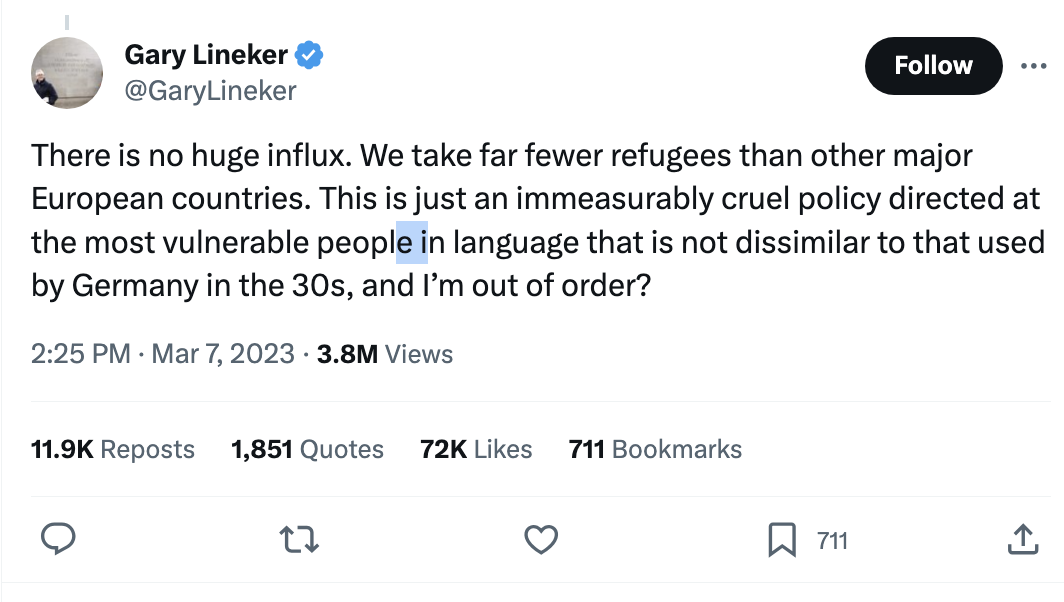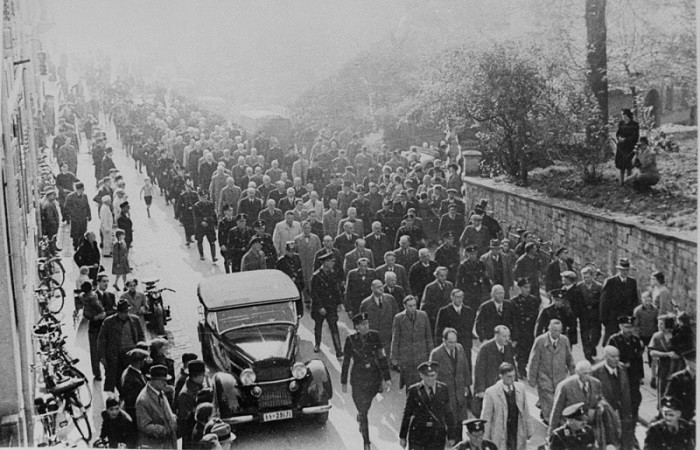From time to time people compare the policies and action of the Israeli government with the policies and actions of Nazi Germany.
For example it was recently reported that Wasim Haq, tweeted on November 11th, 2023, that, “Netanyahu has sacrificed his own people to maintain power … whilst #Palestinians are trying to maintain their sanity. Adolf Hitler would be proud of Benjamin Netanyahu”. A month later, in December 23, a journalist compared the situation between Gaza and a Jewish ghetto in Nazi-occupied Europe (see here).
Some people argue that comparing Nazi policy to Israeli policy is anti-semitic.
The World Jewish Congress makes this point and has various arguments for why someone with anti-semitic objectives might make this comparison. Certainly they make a reasonable case for why some people might chose to draw a comparison for furthering anti-semitic objectives. But they don’t make the case for why in every instance a comparison is necessarily anti-semitic.
Some people seem to use the rationale developed by other organisations to imply that drawing comparisons between Israeli and Nazi policy is anti-semitic, without personally making the argument themselves.
For example in the case Lord Wolfson, who chairs the Football Association’s Football Regulatory Committee, of which Haq was reported to be a representative, said that, ‘Using the language of Nazism to attack Jews or Israel is one of the examples of antisemitism by the IHRA [International Holocaust Remembrance Alliance].’
For some people the context of the comparison appears to be important, which means that it is possible that comparisons between Israeli and Nazi policy can be made without it being anti-semitic.
For example, [what] the International Holocaust Remembrance Alliance [actually] says [is that] ‘Drawing comparisons of contemporary Israeli policy to that of the Nazis’ could be an example of antisemitism, but that it depends on the ‘overall context’. It doesn’t state the contexts, in which a comparison might not be motivated by anti-semitism, but its definition clearly leaves open the possibility that in some contexts, a comparison can be made without it being seen as anti-semitic.
It has been argued by the World Jewish Congress that Israeli policy with Nazi policy cannot be reasonably compared because the Israeli-Palestinian conflict is a territorial and political one, whereas the Nazi policy included the Holocaust, and attempt to wipe out the European Jewry.
Interestingly, and perhaps this is more of a footnote (I’m not sure) the Congress goes on to argue that Palestinians coined the term Nabka to refer to the ethnic cleansing of Palestine by the Israeli authorities, to draw a comparison with the Holocaust. Nabka means catastrophe, as does Shoah, which is the Israeli word for the Holocaust.
Its certainly true that whatever it is that Israel has done to the Palestinians over the last seventy years, they have not tried to systematically wipe them out.
However, you can argue for a range of other similarities between the actions of the Germans towards the Jews and Israel towards the Palestinians.
For example you can can argue that the Germans weren’t very nice to Jews and that the Israeli state have not been very nice to Palestinians.
You can argue that the Germans invaded other countries because they wanted lebensraum for Germanic people and that the Israeli state is clearly trying to take Palestinian territory and land, to make living room for Israeli Jews.
But then you could draw reasonable comparisons between what the Israeli state are doing to Palestinians and what a range of states around the world, current and old, have done. Why chose Nazi Germany as the comparator?
So, is there a motive for drawing comparisons between Nazi policy, which does not include the holocaust, and other areas of Israeli policy, that is not anti-semitic?
One thing to take into account is this.
It has been argued that the state of Israel was created to give the Jewish people a homeland, where they could be safe, in response to the fact of the holocaust. In other words, there was an ambition to achieve a world in which one group of people would not wipe out another group of people.
One of the things about Nazi Germany that many historians have noted is that Nazi Germany did not develop its ideology in isolation from the rest of the world. It has been pointed out that theories and ideas about racial supremacy, in relation to Jewish people, in relation to Black people, in relation to non-Whites was prevalent across Europe and the United States of America, and informed the eugenics movement as well as the justification for the slave trade.
It has been argued that whilst the Holocaust happened in Nazi Germany, it could have quite easily happened elsewhere. After all there were pogroms in Russia and the Ukraine in the late nineteenth century, and there have been other slaughters of Jewish peoples in Spain and England even further back in time.
The point is, is that there is a general climate of hatred and dehumanisation of a dominant group towards other minorities, which is a common feature of human history and society, which was strong across Europe and the United States in the twentieth century, which laid the political and social groundwork for the development and implementation of the Holocaust.
In other words, its easy for any country to slip into genocide and Holocaust. Serbia. Indonesia. Rwanda. Sudan.
Human society keeps doing this, much to the sadness of those who want to see it stop forever.
So, there is at least a motive for drawing comparisons between Nazi policy, pre-holocaust, and the policies of other nation states, that is driven by humanism, rather than anti-semitism.
One way in which those who want to see it bought to an end, go about trying to prevent it, is to draw parallels between what was happening in the years leading up to and prior to the Holocaust in Germany, and events in other countries today. The idea is that by drawing comparisons between the language and behaviour of states today, with those of pre-holocaust Germany can help red flag developments, which if not checked and managed, may slowly evolve into genocide and holocaust.
It is clear, for example, that when Gary Lineker, the footballer compared the language used in asylum policy with the language used by Nazi Germany in the 1930s, presumably before the holocaust had started, that he was not comparing British immigration policy to the holocaust, and he was not acting from anti-semitic motivation.
(David Tollerton took Gary Lineker to task with a spurious argument, specifically that the Nazis were concerned with communities within their own borders, not immigrants. But this is not clearly the case. Nazis went after Jews all around Europe. Furthermore the British immigration policy more widely targets communities within the UK, including Black people who had the right as British citizens to live in the UK, and people who were living as migrants within the UK. Tollerton also points out that the Nazis persecuted and murdered the Jewish population. But the Nazis in the early 30s had not planned a holocaust, the holocaust evolved from a serious of steps, and that is precisely the point that Lineker was making, better to nip this stuff in the bud in the early days – to prevent it from nurturing even greater horrors down the line.)
And here we have Joan Salter, a Belgian Jewish woman (I’m assuming) drawing equivalences between the language used by Suella Braverman to describe immigrants coming into the United Kingdom and the kind of language used by Nazi Germany to justify the murder of Jewish people in Europe. This statement, coming from a Jewish woman, surely, cannot be driven by anti-semitism (though I am willing to be challenged on the point).
If a Jewish person compares some aspect of pre-holocaust Nazi Germany to the practices of the Israeli state and defence force, can this be anti-semitic? It happens. See the example above. See also Masha Gessen’s comments on the Israeli destruction of Gaza in 2023. Gessen’s relatives were murdered by the Nazis.
So. We arrive at this point. Comparisons can be drawn between Nazi Germany and other periods of history, without being anti-semitic in their intent.
People may not like the comments because they fear that they have the impact of minimising or denying the importance of the holocaust, they may call such comments anti-semitic to try and stop people from criticising the thing that they are drawing comparisons with Nazi Germany (then we can start to ask the question about why is it that people spuriously play the anti-semitic card to to try and shut people up? And whether that itself is anti-semitic? But that’sfor later). But ultimately such comments can be made without having an anti-semitic intent.
The next question is, if one can draw comparisons between Nazi Germany, pre-holocaust, and other nation states, without being anti-semitic, can one ever do the same with Nazi Germany, pre-holocaust, and Israel, without being anti-semitic?
I don’t know what the answer to this is.
Certainly some comparisons are anti-semitic. They are intended to really fucking hurt. They are a form of violence. A very hurtful and violent form of irony. They may not always be thought through consciously, they may be off the cuff, but the violence is there even if sub-conscious.
And when such comments are made by Palestinians or in the name of Palestinians, the anti-semitism is felt as a game of tit-for-tat. You have bulldozed my family home, you have tortured my father, you have created a constitution, which says I am a second class citizen – and so I am going to fucking hurt you back with this comparison.
The thing that’s bugging me is this.
Deborah Feldman, a Jewish woman, writing in the Guardian, says, “The only legitimate lesson to be learned from the horrors of the Holocaust was the unconditional defence of human rights for all”. One interpretation of Feldman’s point is that Jews will be safe in a time when everyone is safe, because everyone respects and prioritises universal human rights. Creating the state of Israel does not achieve that.
Some people argue that the state of Israel should never have been created because it allowed the western world off the hook. In other words the holocaust should have made western world take a big look at itself, and its history, and how all of this created the conditions for the holocaust. That is to say, the establishment of the state of Israel was a con, a trick, that the western world played on itself, to save itself from the pain and responsibility for creating a new world order, and challenging power and oppression, and capitalism, in a way that would create a more level playing field, and fairness and dignity, and human rights for all.
And so the argument that the creation of Israel allowed the western world off the hook, can also be expanded to suggest that the creation of Israel was if not an anti-semitic act, a neglect of the responsibility to address the causes of anti-semitism in the western world, and a dereliction of the duty to do the only thing that would guarantee the safety of the Jews (and everyone else) – creating and sustaining universal human rights.
But perhaps the creation of Israel not only relieved the western world of taking responsibility for protecting human rights from the 1940s onwards – it also led to people in the west projecting on to Israel a set of expectations and aspirations around the elevation of the human condition. The rationale for the establishment of Israel – perhaps implicit, perhaps explicit, I’m not sure – was that it was not just about the Jews – it was about the universal – it was about the world doing better – about aspiring to create a new level of civilisation and respect and humanity on earth – but projected into and incarnate in this new state. But also arguably based in part on a mythical idea about Israeli Jews being inherently good because they had endured such evil. Weirdly, as I think about this more, it is as if the western world set expects the state of Israel to act as a kind of Jesus, pure in spirit and so absolving the western world of its sins. And perhaps this in turn ties into the Christian belief, written into the book of Revelations, that Christ will return to earth when the Jews turn to Jesus and Christianity.
But Israel can never live up to this inhuman aspiration. So Israel has to be a failure, and the western world finds that the discomfort with its own anti-semitism and the things that underpin its anti-semitism, which it tried to absolve itself and cast off on to the the creation of Israel, comes back to haunt it.
Haunted, in discomfort, still not wanting to address its own anti-semitism and the wider underlying factors, the western world reacts in two ways.
Deny. See no evil, hear no evil. Annexation, land grabs, JCB diggers being used to raise Palestinian homes – none of this is happening – or it is happening but uh, whatever… Punish and subdue those who point it out and criticise Israel. Redouble aspirations and expectations back into Israel.
The other is to start to draw comparisons between Israeli policy and Nazi Germany. OK, so perhaps in the first moment when this happens this is some sort of a hint of an acknowledgment of the western world’s failure to address its own anti-semitism. Clearly such comparisons are hinting at the idea that something’s not working here. But only for a micro-second. Such statements acknowledge that Israel has fallen but very quickly pass the responsibility back to Israel, back to the Jews, by reminding them of the expectations that the western world has that, by being victims of Nazi atrocities Jewish people have been cleansed of evil – that the western world expects them to be good – role model human beings – a Jesus to the western world – showing the world how to live – to be better than the Nazis. How can you do this to the Palestinians when the Nazis did this to you? And so by referring to the Nazis, the person making the criticism stops the western world from facing up to its own history and current practice of racism and anti-semitism – the western world finds it almost impossible to handle the fact that without its support and encouragement Israel could not do much of what it does to Palestinians.
So, arguably then, drawing these comparisons is always anti-semitic. But no more anti-semitic than turning a blind eye to what Israel is doing.
The pro-semitic thing, to go back to Feldman’s point, would be to insist on human rights for all and to act accordingly.
But is this possible? What does this look like? Has it ever been achieved?









